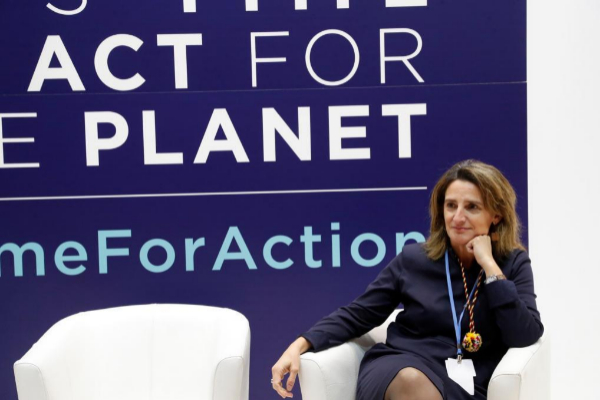In politics there are poisoned gifts. But there are also missions that would be said in principle poisonous and that, in the end, become a springboard for those who throw the task on their shoulders and solve it. The time trial organization of the Madrid Climate Summit, which Pedro Sánchez entrusted to Teresa Ribera with just one month in advance, belongs to this second category. The then acting minister is now vice president of Ecological Transition and Demographic Challenge of the Government of Spain.
The president achieves a double political objective with this appointment: on the one hand, he enhances the importance of environmental and rural development policies, in which it will be easy to find the support of his Government partners, while placing him in the first row of the Executive to a woman ideologically close.
In fact, Ribera joined Sánchez's group of experts in 2015 to prepare the PSOE electoral program, and had already been part, as Secretary of State, of the Government of José Luis Rodríguez Zapatero , between 2008 and 2011. Sánchez's bet for raising Ribera to a Vice Presidency is not new. In June, the still acting president already considered it, as Carlos Segovia reported, but the failure of the investiture at the end of July frustrated him.
As Minister for the Ecological Transition, the biggest controversies in Ribera have come at the expense of projects restricting the circulation of cars and their positions contrary to hunting and bulls .
The limitation of the most polluting vehicles from the year 2040 is one of the most important points, and one of the ones that have given the most and will have to discuss its concrete application, within the draft Climate Change Law, which is presented as One of the great objectives of the legislature. Its fluctuations on the limitations to the use of diesel caused protests in the sector, which accused it of falling sales.
In December 2018, the then Minister for the Ecological Transition advocated the prohibition of bullfighting, always clarifying that she did not speak on behalf of the Government: "From a personal point of view, I am clear about my option, and my option is to enjoy live animals. It has always been very striking that there are people who enjoy watching die or see animals suffer, "he said during an interview on Wave Zero. Asked if, personally, he would ban hunting and bulls, his answer was: "Yes, indeed."
The origin of the jump to the Vice Presidency of Teresa Ribera is in its close relationship with climate change policies, a theme that has been focused for almost two decades and culminated with the organization, forced marches, of the Madrid Summit on last December.
10 days after the November general elections, Pedro Sánchez offered Chile the possibility of holding the UN conference on climate change in Madrid, given the security problems suffered by the South American country. As head of his organization, Teresa Ribera had an unprecedented challenge ahead, but also an ace in the manga: if the logistics were resolved without any problem, as it was, the merit would be his. While the responsibility for the negotiations, whose results were not so satisfactory, fell to Chile , which presided over the summit despite the change of venue.
Spain complied with the organization and Teresa Ribera still scored a bit extra when she helped the Chilean presidency to unblock the negotiations and reach, in the last breath, a minimum agreement . Climate change, an area to which he had worked in different positions and sectors since 2001, has made headlines and stood, as never before, at the epicenter of the political landscape. Guild mentors began to place the person in charge of organizing the Summit as a firm candidate to make the leap to the Vice Presidency.
The rumors, this time, have been confirmed. Teresa Ribera, 50 and with three daughters, will be vice president of the first coalition government of this democratic stage. Official of the Superior Body of State Administrators and graduated in Law from the Complutense University, she began her career in high politics on April 18, 2008, when the Government of José Luis Rodríguez Zapatero appointed her Secretary of State for Climate Change.
In 2009, at the relevant UN Summit in Copenhagen, she had the opportunity to show her experience in this area, because in 2001 she had already entered as head of the area at the newly created Spanish Climate Change Office, which she began to coordinate in 2004 When the PSOE lost the Government, in 2011, Ribera went into private activity, although always linked to the environmental issue, since she worked as general director in the Isofotón solar panel company. In summer 2014, she was appointed director of the French Institute for Sustainable Development and International Relations (Iddri), a think tank based in Paris.
In June 2015, with Mariano Rajoy in La Moncloa and at the head of a Popular Party that had just been the most voted force in the regional and municipal elections, Pedro Sánchez signed Ribera, along with the professors Victoria Camps and Silvina Bacigalupo, to to advise him in the elaboration of the electoral program with which he intended to reach the Government. The road turned out to have more meanders, and be more tortuous, than anyone would have imagined. But Sánchez, and with him Teresa Ribera, are in charge of the Executive.
According to the criteria of The Trust Project
Know more
